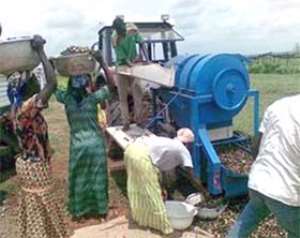
Biofuel Africa Limited has moved from growing and selling jatropha fruits and seeds to the production and sale of jatropha oil on a commercial scale for direct use.
The company, which is the first in West Africa to begin the production and sale of Jatropha oil on a commercial sale without modification and as a feedstock for biodiesel and synthetic diesel, is a Ghanaian corporation that is wholly owned by Norwegian-based Solar Harvest AS.
The Chief Executive Officer and Director of BioFuel Africa, Steinar Kolnes said, “This is a major milestone for the biofuel industry in West Africa.
“The industry has taken some time to mature, but now we are beginning to see the fruits of our collective labor and everyone, including local farmers, communities, government and biofuel producers will benefit.”
In hot climates like Ghana, it is possible to use Straight Vegetable Oil (SVO) that is unrefined or chemical additives without modifications.
This means that it can be produced in rural areas with simple hand-operated oil presses or more advanced screw presses, making it possible for local communities to be grid-independent and create their own fuel sources easily.
The company is currently running a program to test its SVO as a “drop-in” replacement to fossil fuel for running tractors, cars, generators and other machinery.
Its own equipment and machinery is already 100 percent fossil fuel-independent, but so far results confirm that vehicles and machines running on SVO give the same performance.
Because purity is important, SVO should be well-filtered or purified in centrifuges before being poured into fuel tanks, however this process is relatively simple and cheaper.
BioFuel Africa had its first working farm in operation in 2007, concentrating its efforts on planting out acreage for cultivation.
Between its leased lands in the north and test farm in the south, the company currently has 660 hectares (1,631 acres) of jatropha under cultivation.
In addition to jatropha fields, Biofuel Africa has also increased additional acreage for local farmers' food crops with plans to cultivate another 2,550 hectares (6,300 acres) of maize, rice and soybeans in 2010.
It would also produce approximately 6,000 – 8,000 tons of additional food crops for the 2010 season.
Biofuel companies that combine local food production with generation of a renewable local fuel source are proving that jatropha is an attractive and viable commodity for developing economies, which are plagued with food security issues, exorbitant fuel prices and infrastructure lapses.
BioFuel Africa has focused on community development activities such as installation of water dams and maize mills, which are exclusively for community use.
It has established local clinics and payment for school teachers and helped rural communities to realize lasting poverty-reducing benefits. BioFuel Africa Limited, which has been in Ghana since 2003, has established its first working test and research farm near Sugakope, near Accra in 2007.
BioFuel Africa was the first company in Ghana to receive Environmental Protection Agency (EPA) approval for a jatropha plantation. An independent company recently verified that jatropha oil from BioFuel Africa plantations reduces carbon dioxide lifecycle emissions by 78 percent as compared to diesel fuel.




 Akufo-Addo spotted ordering chiefs to stand for his handshake
Akufo-Addo spotted ordering chiefs to stand for his handshake
 Akufo-Addo ‘disrespects’ every chief in Ghana except Okyenhene — NDC Communicato...
Akufo-Addo ‘disrespects’ every chief in Ghana except Okyenhene — NDC Communicato...
 Supreme Court clears way for dual citizens to hold key public positions
Supreme Court clears way for dual citizens to hold key public positions
 Be transparent, don’t suppress the truth – Prof. Opoku-Agyemang to Jean Mensa
Be transparent, don’t suppress the truth – Prof. Opoku-Agyemang to Jean Mensa
 ‘I won’t tell the world I was only a driver’s mate during challenges’ – Prof Jan...
‘I won’t tell the world I was only a driver’s mate during challenges’ – Prof Jan...
 We’ll prosecute corrupt officials of Akufo-Addo’s govt – Prof Jane Naana
We’ll prosecute corrupt officials of Akufo-Addo’s govt – Prof Jane Naana
 [Full text] Acceptance speech by Prof Jane Naana Opoku-Agyemang as 2024 NDC Runn...
[Full text] Acceptance speech by Prof Jane Naana Opoku-Agyemang as 2024 NDC Runn...
 Election 2024: Don’t be complacent, we haven’t won yet – Asiedu Nketia cautions ...
Election 2024: Don’t be complacent, we haven’t won yet – Asiedu Nketia cautions ...
 Election 2024: Stop fighting over positions in Mahama’s next govt – Asiedu Nketi...
Election 2024: Stop fighting over positions in Mahama’s next govt – Asiedu Nketi...
 Prof Jane Naana Opoku-Agyemang will restore dignity of vice presidency – Fifi Kw...
Prof Jane Naana Opoku-Agyemang will restore dignity of vice presidency – Fifi Kw...
